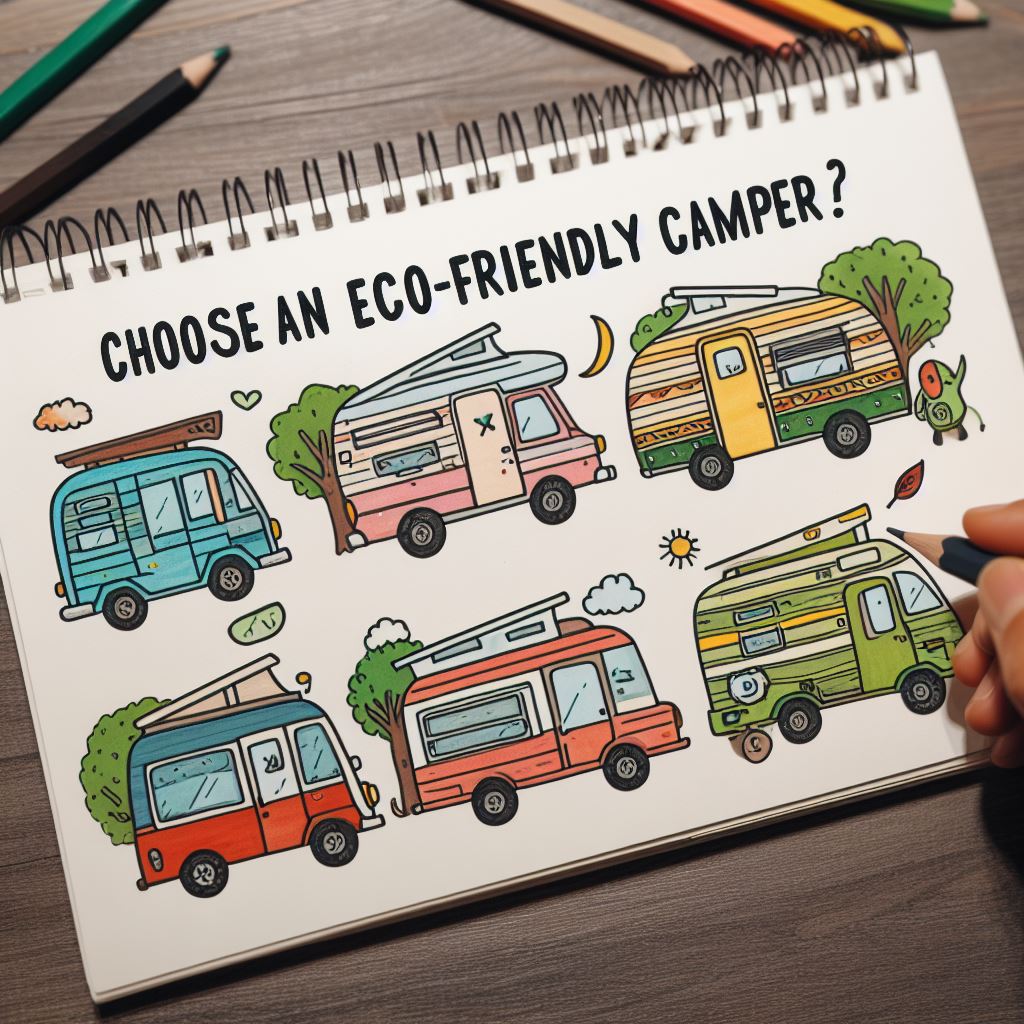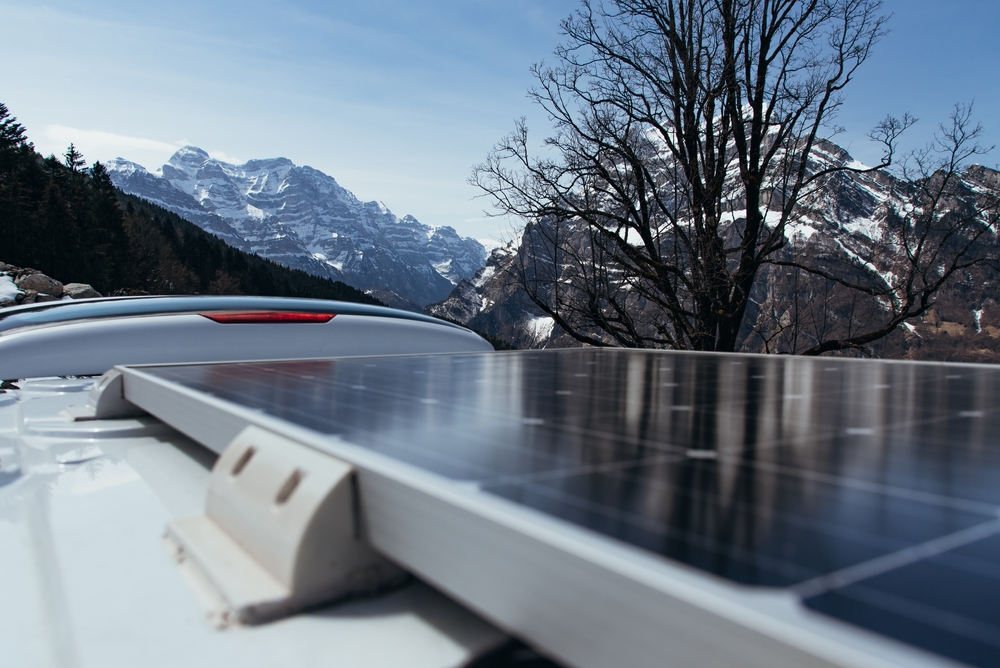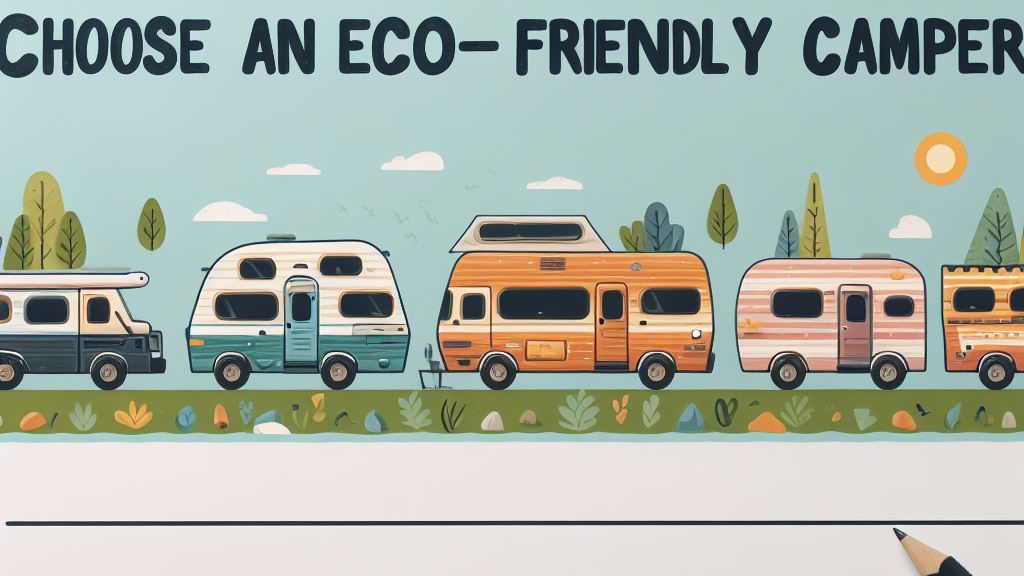Are you an Eco-Friendly Camper? Are you looking for Sustainable Travel Tips for the Road? Hop aboard, you’re on the right track!

Are you a nature enthusiast who loves to explore the great outdoors? If so, then embarking on a sustainable journey in an eco-friendly camper might just be the perfect way for you to travel. In this article, I will provide you with a comprehensive guide on how to make your camper experience as environmentally friendly as possible.
From choosing biodegradable products to finding sustainable electricity options and supporting eco-friendly campsites, we will cover all aspects of sustainable travel. So, let’s hit the road and make a positive impact on the environment while enjoying the beauty of nature.
Choosing an Eco-friendly Camper | Your Comprehensive Guide

The journey to an eco-conscious camping adventure starts with selecting the right vehicle. Eco-friendly campers prioritize sustainable designs, featuring components like recycled materials or integrated renewable energy solutions. Moreover, a smaller camper size directly translates to a reduced environmental footprint. It’s essential to thoroughly research camper brands that emphasize sustainability and align with your eco-friendly values.
Planning an RV road trip but not sure where to start? Dive into our comprehensive RV Road Trip Itineraries for inspiration and practical guidance. From scenic coastal drives to breathtaking mountain routes, our curated itineraries cover the most spectacular destinations. Get tips on must-see stops, travel durations, and the best times to visit, all tailored to enhance your RV adventure. Start crafting your perfect journey today!
Want to delve deeper into vehicle rentals? Explore a wide range of options and user reviews at Car Rental Reviews.
Eco-friendly Camper Equipment Checklist
| Equipment | Benefits | Considerations |
|---|---|---|
| Energy Star Appliances | Reduce energy consumption | Ensure compatibility with camper size |
| LED Lights | Energy-efficient, long lifespan | Ensure they match the camper’s voltage |
| Solar Panels | Harness renewable energy, reduce costs | Professional installation recommended |
For a camper’s interiors, it’s pivotal to invest in sustainable and biodegradable elements. Choosing natural fibers like organic cotton or bamboo for bedding and curtains is both eco-friendly and comfortable. Steer clear of synthetic items and prioritize non-toxic paints and finishes. Such decisions not only contribute to an environment-friendly approach but also promise a healthier habitat during your travels.
For more in-depth information on sustainability and environmental conservation, check out the Environmental Protection Agency (EPA). They offer valuable resources and guidelines on living and traveling sustainably.
My Journey to an Eco-Friendly Camper with Biodegradable Products
As I embarked on my journey to make my camper eco-friendly, I realized the profound impact of choosing biodegradable products. There’s an expansive range of options, from cleaning supplies to personal care items, all designed to be sustainable without compromising on effectiveness.

- Cleaning and Maintenance: I always reach for biodegradable soaps, shampoos, and detergents. They’re devoid of damaging chemicals and are a friend to our Earth. Moreover, I’ve transitioned to reusable products like cloth towels and sustainable food containers, cutting down on waste considerably.
- Personal Care Selections: I’ve grown fond of brands that value sustainability and natural ingredients. It’s become easier than ever to find items free of microplastics and parabens. My recent favorites? Bamboo toothbrushes and refillable shampoo bottles. There’s also a rising trend of biodegradable feminine hygiene products, all of which have helped me reduce my environmental footprint without sacrificing modern-day comforts.
- Minimizing Waste on the Move: My trusty reusable water bottle accompanies me everywhere. Filling it up at water stations or directly from pristine natural sources, I’ve successfully bypassed the use of single-use plastics. My trips to the local stores? Always armed with my reusable shopping bags, saying no to excess packaging.
The joy of these transformations is beyond words. It’s not just about protecting the environment; it’s about aligning my actions with values that matter. If you’re intrigued about different eco-friendly car rental options to pair with this lifestyle, dive into this guide on Eco-Friendly Trips.
For those eager to understand more about biodegradability and sustainability, the Environmental Working Group offers a treasure trove of insights. Their extensive research and recommendations have been a constant source of enlightenment for me.
Green Power Choices for Your Eco-Friendly Camper
Powering my camper in a way that treads lightly on our Earth has always been a priority. Thankfully, numerous sustainable electricity options have cropped up over the years, making eco-friendly road trips a breeze.
- Solar Panels: As I touched upon before, decking my camper’s roof with solar panels has been game-changing. These panels diligently charge my camper’s batteries, ensuring all my appliances run smoothly without any dependence on fossil fuels.
- Portable Wind Turbines: Beyond the sun, the wind has been a faithful ally. With a portable wind turbine, even breezy days can be harnessed for electricity. It’s a fantastic backup for times when the sun plays hide and seek.
- Propane and Natural Gas Solutions: Shifting to propane or natural gas for cooking and heating was a no-brainer. Propane, especially, boasts of being a cleaner-burning fuel in comparison to its fossil fuel counterparts. I’ve kitted my camper with energy-efficient appliances that run on these fuels, from stoves to heaters, slashing my carbon footprint significantly.

These sustainable choices aren’t just about reducing emissions – they symbolize my commitment to a greener future. For those curious about sustainable driving options, do check out Eco-Friendly Trips for more insights.
Waste Management in an Eco-Friendly Camper | Leave No Trace
Proper waste management is crucial when it comes to sustainable travel in an eco-friendly camper. The “Leave No Trace” principle is a guiding principle for minimizing your impact on the environment. Always carry biodegradable trash bags and dispose of your waste properly at designated dump stations or recycling facilities. Never dump waste, including blackwater and greywater, in natural water sources or on the ground. Use environmentally friendly cleaning products to minimize the impact on ecosystems.
To further reduce waste, practice composting. Composting is a natural process that turns organic waste into nutrient-rich soil. Bring a small compost bin with you and separate your food scraps from other waste. Once your compost bin is full, find a composting facility or a community garden where you can properly dispose of your compost. By composting, you are not only reducing waste but also enriching the soil and contributing to a healthier ecosystem.
🚗 Looking for More on Affordable Car Rentals? 🚗
Dive deeper into the world of budget-friendly travel in our detailed feature on affordable car rentals. Whether you’re a seasoned traveler or planning your first road trip, our guide at Car Rental Reviews is packed with insider tips, essential considerations, and expert advice to help you make the most out of your rental experience without overspending. Navigate your way to the best deals and smart choices today!
Discover more and drive smarter. Read our comprehensive guide on affordable car rentals here.
Green Camper Care | Your Go-To Eco Maintenance Checklist
🌱 Eco-Friendly Drive:
- Check Tire Pressure: Keep them properly inflated for optimal fuel efficiency. This not only reduces emissions but also extends tire life.
- Regular Servicing: Ensure the engine is running efficiently. Well-maintained engines emit fewer greenhouse gases.
Water Conservation:
- Plumbing Inspection: Regularly check for leaks to prevent wastage. A small drip can result in gallons of wasted water over time.
- Efficient Faucets: Consider installing water-saving faucets and showerheads.
🌱 Energy Optimization:
- Solar Panel Maintenance: Clean panels and ensure they’re free from obstructions. Regular upkeep ensures they’re capturing maximum sunlight.
- Battery Health: Regularly check the health of your camper’s batteries. Efficient batteries store more energy from renewable sources.
Sustainability:
- Material Check: Opt for sustainable or recycled materials when replacing or upgrading any camper parts.
For insights into how the car rental industry is evolving with eco-friendliness in mind, take a peek at the Future of Car Rental.
Want to explore more about sustainable vehicles? The Alternative Energy Store provides a plethora of information on eco-friendly energy solutions for vehicles and homes.
Stay green and ensure your camper adventure treads lightly on our beautiful planet. 🌎💚
Packing for an Eco-Conscious Trip | Minimize Gear, Maximize Efficiency
When packing for your eco-conscious trip, remember to pack light and only bring the essentials. The heavier your camper, the more fuel it will consume, resulting in a higher carbon footprint. Opt for multi-purpose items that serve multiple functions, such as a camping stove that can also be used as a grill.
Consider renting or borrowing gear that you will only use occasionally, rather than buying new items. By minimizing your gear and maximizing efficiency, you can reduce waste and make your camper experience more sustainable.
Driving Your Camper with Sustainability in Mind
Driving your camper with sustainability in mind is another essential aspect of eco-friendly travel. Plan your routes in advance to minimize mileage and fuel consumption. Avoid idling your engine for long periods and turn off your engine when parked. Drive at a moderate speed to improve fuel efficiency. By adopting these driving habits, you can reduce your carbon emissions and make your camper journey more environmentally friendly.
Eco-Friendly Campsites | Supporting Sustainable Communities on the Road
Choosing eco-friendly campsites is a great way to support sustainable communities and minimize your environmental impact. Look for campsites that have implemented sustainable practices, such as recycling programs, renewable energy sources, and water conservation measures.
Many campsites now offer eco-friendly amenities, such as composting toilets and solar-powered showers. By staying at these campsites, you are not only reducing your impact on the environment but also supporting businesses that prioritize sustainability.
If you’re planning to rent a car, it’s essential to be aware of potential additional charges that might surprise you at the checkout. Dive deeper into the topic by reading our guide on Understanding Extra Car Rental Fees, where we break down these costs and help you avoid any unexpected expenses.

Community Involvement for a Greener Journey
Being a part of a community not only enriches our experiences but can also make our journey towards eco-friendliness more impactful. Here’s how you can make a difference:
- Share with Passion: Document your sustainable camper adventures and share them on social media. Your stories might inspire someone to start their own eco-friendly journey.
- Engage in Forums: There are numerous online communities where you can exchange sustainable travel hacks, camper maintenance tips, and more.
- Learn & Network: Attend workshops or webinars about green travel. This will not only improve your knowledge but also expand your circle with those who share the same passion.
- Support Local Events: Participate in or sponsor local green travel events. It’s an excellent way to give back to the community while promoting eco-friendly practices.
Remember, every little effort counts. The more you engage with the community, the more you amplify the message of sustainability. And as you embark on your sustainable travel adventures, whether it’s a long journey or a last-minute weekend rental, stay updated with the latest trends and practices in the car rental industry. Being informed is crucial to ensuring our travels align with eco-friendly goals.
Find the Best Eco-Friendly Camper Solutions with CRR Today!
Embarking on an eco-friendly camper journey is an exciting and rewarding experience. By following the sustainable travel tips shared in this article, you can minimize your environmental impact and make a positive contribution to the planet.
From choosing biodegradable products to supporting eco-friendly campsites and driving with sustainability in mind, every small action adds up to create a more sustainable future. So, pack your bags, hit the road, and let your eco-friendly camper adventure begin!

Remember, the choices you make today can make a world of difference tomorrow.
Explore eco-friendly camper options that align with your sustainable travel goals. Visit Earth911 for more information on recycling and waste management. And don’t forget to join the Sustainable Travel Community to connect with like-minded individuals and learn from their experiences. Happy travels!
Eco-Friendly Camper Practices | Frequently Asked Questions
1. What makes a camper eco-friendly? An eco-friendly camper is designed with sustainability in mind. This can include being made from recycled materials, using renewable energy sources like solar panels, and having energy-efficient appliances installed.
2. Are biodegradable products necessary for an eco-friendly camper experience? Yes, biodegradable products play a significant role in ensuring the camper experience is eco-friendly. They break down naturally without harming the environment, unlike regular products that can contribute to pollution and landfill waste.
3. How do solar panels benefit an eco-friendly camper? Solar panels harness renewable energy from the sun to power the camper’s appliances, reducing reliance on fossil fuels. This helps in minimizing the carbon footprint and also saves money in the long run.
4. What is the “Leave No Trace” principle? The “Leave No Trace” principle emphasizes minimizing one’s impact on the environment while camping. It encourages campers to dispose of waste responsibly, avoid disturbing natural habitats, and ensure they leave a site just as they found it.
5. How can I find eco-friendly campsites? Eco-friendly campsites prioritize sustainability. They often have recycling programs, use renewable energy sources, and adopt water conservation measures. Researching online and checking eco-travel communities can help you find such sites.
6. Why is community involvement essential for promoting eco-friendly camper practices? Community involvement amplifies the message of sustainability. Sharing experiences, joining forums, and participating in events spreads awareness, educates others, and collectively drives the move towards a more sustainable camper culture.
